13 Benefits of Cloth Diapers Every Parent Should Know
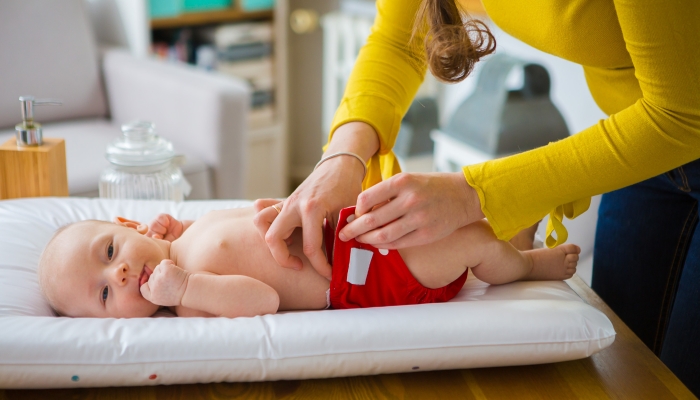
- There are several health benefits that come with the use of reusable diapers.
- Cloth diapers do more good than harm to the environment, even with their use of water and electricity.
- Lesser-known benefits like fabric options, cloth diaper services, and future use for siblings shouldn’t go unnoticed.
- If you can’t make the switch to modern cloth diapers, there are other eco-friendly options outside of wearing disposable diapers.
Parenting is an endless series of decisions. Breastfeed or bottle feed? Rock to sleep or cry it out? Stay home or daycare? The list could go on and on, and the diapering decision is just another on that long list. Cloth diapering definitely has its fair share of benefits, but what exactly are they?
Maybe you’re deciding between the two, or you’re considering making a switch from the single disposable diaper to a cloth diaper system. Whatever your reason, knowing all the benefits of cloth diapers can help make your decision seamless.
3 Health Benefits of Cloth Diapers
If you’re asking yourself if cloth diapers are worth it, the set of health benefits they come with may be enough to sway you—especially when these are health benefits that a disposable diaper just can’t hold up against. Take a look at these 3 health benefits that are sure to keep your baby’s skin happy:
- Reduces Diaper Rashes: Parents using cloth diapers claim they see less diaper rash. Reusable diapers usually get changed more frequently as they absorb less waste. That reason, coupled with the lack of irritants added to reusable diapers in manufacturing, means less room for rashes to pop up.
- Allergy Friendly: Speaking of skin irritants, disposables have a tendency to irritate the skin. Disposable diapers have also been said to create respiratory issues, even asthma. If your baby has naturally sensitive skin, cloth cotton diapers offer an allergy-friendly alternative.
- Less Chemical Exposure: Disposable diapers are packed full of chemicals that allow those diapers to get extra full. It comes at a cost, though, as those harmful chemicals can rub off on your baby while wearing them.
A 2012 article published in the Journal of Environmental Science and Engineering states:
“Disposable diapers have been implicated by diapering proponents like leakproof polymers, super absorbent polymers and some scented chemicals which are the key factors for everything from chronic diaper rash, respiratory problems like asthma, male infertility even to testicular cancer.”
You can rest assured that cloth diapers don’t pose these kinds of serious issues as they’re made with cotton.
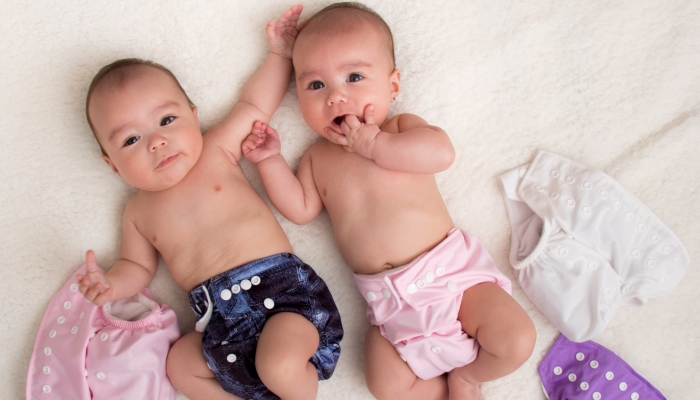
5 Environmental Benefits of Cloth Diapers
While some say the use of water, electricity, and laundry detergent cancel out any good to the environment cloth diapers could do, that’s not entirely true. Energy-efficient washers nowadays use less water. Low heat settings on dryers use less electricity. Not to mention there are plenty of eco-friendly detergents on the market now.
That said, the use of cloth diapers does far more good than harm, especially when up against the many damages disposable diapers do to the environment. Check out the 5 environmental benefits of cloth diapers below.
- Less Landfill Use: Each year, more than 18 billion disposable diapers are deposited at landfills across the world. A disposable diaper takes 450 years to decompose there. Yes, you read that right, 450 years! Cotton, on the other hand, the fabric used to make cloth diapers, only takes 5 months to decompose.
- Fewer Chemicals: Cloth diapers are free from the harmful list of chemicals used in disposable diapers. Phthalates, dyes, formaldehyde, and adhesives are all on that list. These chemicals are eventually introduced into the environment when they’re thrown away.
- They’re Recyclable: You’re able to recycle your old cloth diapers, unlike disposable ones. You have a few options, starting with dropping them off at a local textile recycling facility. If that’s not an option, you can send them to one of many cloth diaper recycling companies, and they’ll do the hard work for you!
- Less Manufacturing Waste: With the manufacturing of disposable diapers comes a lot of waste products, much of which are chemical based. These can’t just be disposed of in any old way, which is another issue in itself. Cloth diapers, on the other hand, don’t produce nearly the same level of manufacturing waste.
- Protects the Groundwater: The disposable diapers thrown in the landfill can introduce human waste into the groundwater over time. The waste isn’t a concern with cloth diapers as they are properly disposed of after running through the sewage system.
5 Bonus Benefits of Cloth Diapers
The other advantages of cloth diapering go beyond those commonly mentioned, like cost and potty training, though we’ll definitely touch on those later. The list below offers you some benefits of cloth diapering that you may not have thought of before. Though they’re less frequently recognized, they’re certainly not throw-aways (pun intended)!
- Overall Comfort: It’s hard to beat the comfort of organic cotton. While disposables aren’t necessarily uncomfortable, their main components contain wood pulps and plastics. You be the judge of which sounds most comfortable on the skin.
- No Running Out: It’s the worst when you’re winding down for the day and find you’re on your last disposable diaper. With cloth diapers, there are no more late-night trips to the store; you already have everything you need!
- Cloth Diaper Service: If cleaning your own cloth diapers is a deterrent for you or if you’re just not sure how to clean cloth diapers, there’s a solution. You can use cloth diaper companies that will clean the dirty diapers for you! Though it does add to total diaper costs, it saves you the dreaded wash routine.
- Fabric and Pattern Options: The main fabric used for cloth diapers is cotton, but they’re also made from hemp, fleece, bamboo, modal and more. They also come in so many fun patterns that beat the boring disposable aesthetic.
- Reuse for Siblings: Though the average lifespan for cloth diapers is 2-3 years, it’s not unusual for them to hold up long enough to pass on to the next child. This only adds to the money saved over time!
Why Are Cloth Diapers Cheaper and More Cost-Effective?
It’s no secret that one of the main draws of using cloth diapers is the money saved over time. Why are they cheaper, though? Simply put, they’re a one-time investment rather than a monthly expenditure. The ability to reuse them makes the upfront cost a worthy investment in the long run.
All in, you’re likely to spend about $1,000 or less on cloth diapers, noting that they’ll last you around 2 to 3 years. In comparison, disposable diapers usually cost $2,000 (often more) for that same amount of time. You’re easily looking at spending half of what you would on disposables in your child’s two years of diapering.
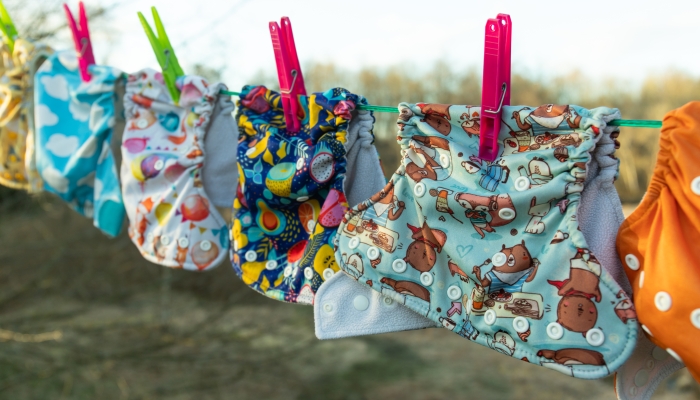
Do Cloth Diapers Make Potty Training Easier?
While there are a fair amount of differing opinions on this subject, most will agree that kids who have worn cloth diapers appear to potty train much easier than those who have worn disposables. Disposable diapers are made with chemicals that help make the diapers feel less dirty to the child than they actually are.
It’s because of this that kids wearing disposables aren’t as aware of when they’re fully wet and the discomfort that comes along with that feeling. This isn’t the case with cloth diapers!
Your child is able to feel the wet cotton right up against their skin, making the recognition process of potty training somewhat ingrained in them from the start. They can be one of the best tools in your toolbelt with regard to potty training and elimination communication.
FAQs
Do pediatricians recommend cloth diapers?
As far as pediatricians are concerned, there’s really no formal recommendation on cloth diapers versus disposable diapers. As long as you’re changing your baby frequently and avoiding those rashes your doctor should support whichever kind of diaper you choose. It’s a personal choice, like many of the options that come with parenting.
Are there other options if I can’t commit to cloth diapers?
Yes, aside from cloth diapers, there are other more environmentally friendly options that help you to avoid using disposables. Companies like Honest, Dyper, and Seventh Generation offer products that are sustainable, chemical-free, and biodegradable. Still, read the labels, as they’re not all created equally—but they’re certainly a strong alternative.
Do I need to use cloth wipes with my cloth diapers?
Nothing says you have to use cloth wipes too if you’re using cloth diapers. Even so, if your aim is to protect the environment, cloth wipes are the way to go. Disposable wipes are a huge culprit for sewer blocks and ocean pollution, whereas cloth wipes get laundered and are reused year after year.
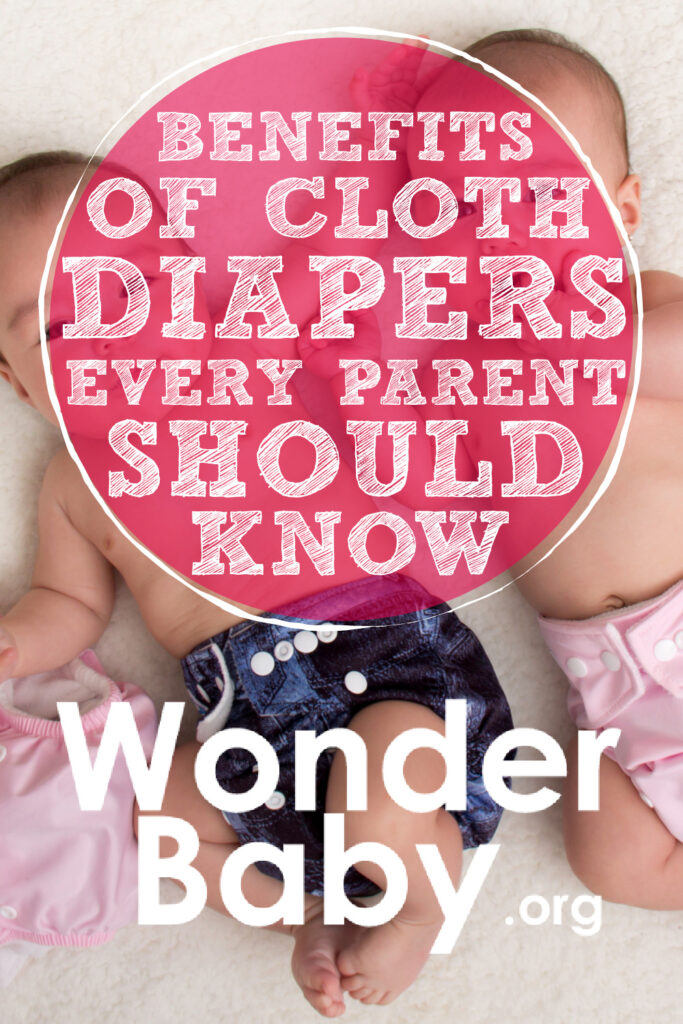
Related Posts
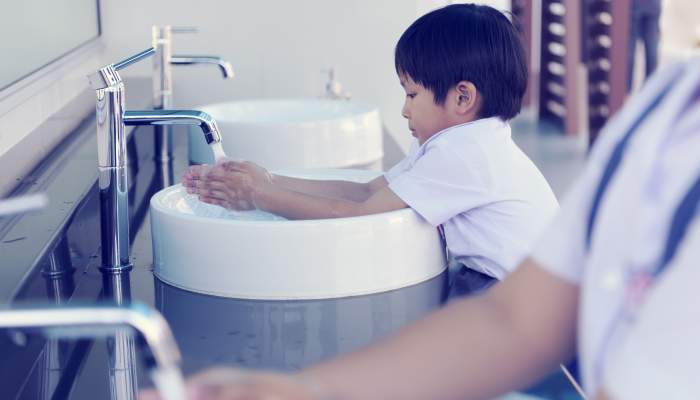
IEPs, Potty Training
7 Sample Toileting IEP Goals
Toileting IEP goals should address the specific needs and abilities of each child. Be flexible and patient as your child works on their toileting skills.
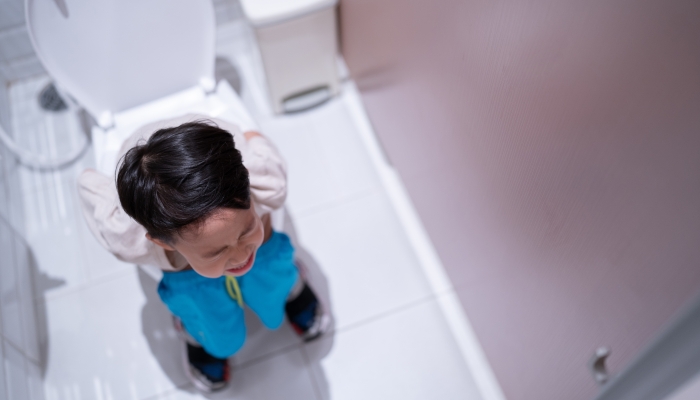
Potty Training
How To Deal With Constipation When Potty Training
Constipation is common amongst children of potty training age. Many children suffer from potty training constipation, but there are things you can do to help.

Potty Training
5 Potty Training Games To Make Potty Training Fun
Learning to use the toilet doesn’t have to feel like hard work. There are lots of potty training games you can play with your toddler to make learning fun.